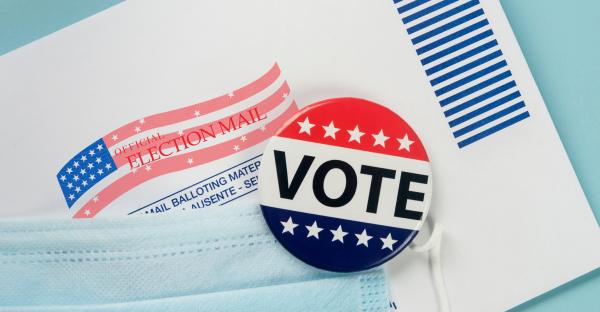
Employment
Viewpoints
Filter by:
The Impact of the Consolidated Appropriations Act on Flexible Spending Arrangements
January 25, 2021 | Blog
In this post we begin an in-depth examination of these provisions starting with the Consolidated Appropriations Act’s effect on flexible spending arrangements, which provides employers with an expanded set of options to allow mid-year election changes.
Read more
Transcript: “Pay Equity – What Compensation Committees Need to Know”
January 13, 2021 | Blog | By Anne Bruno
Read the transcript of CompensationStandard.com’s November 2020 webcast titled, “Pay Equity: What Compensation Committees Need to Know” in which Anne L. Bruno was among the experts to discuss pay equity, shareholder expectations, disclosure trends, board oversight, and more.
Read more
WEBINAR REMINDER: Mandatory or Voluntary Workplace Vaccination — Guidance for Employers
January 13, 2021 | Blog | By Geri Haight, Jennifer Rubin, Joanne Hawana
Please join Mintz’s Employment, Labor & Benefits and Health Law attorneys and noted immunologist Dr. Darryl Carter for a webinar to discuss key takeaways from the EEOC’s recently updated vaccination guidance and other COVID-19–related workplace question.
Read more
New York City Amends Fair Chance Act, Further Limits Employers’ Consideration of Criminal History
January 8, 2021 | Blog | By Corbin Carter, Michael Arnold
The New York City Council has expanded NYC’s Fair Chance Act to further restrict NYC employers from taking adverse actions against applicants or employees based on their criminal history. The law will go into effect on or about July 28, 2021. We highlight the changes in the law and action items below.
Read more
California East? D.C. Passes Comprehensive Ban of Non-Compete Agreements
January 8, 2021 | Blog | By David Barmak, Danielle Bereznay
The District of Columbia Council has passed the Ban On Non-Compete Agreements Amendment Act of 2020 (“the Act”). If it goes into effect (and we are monitoring closely whether it will), it will almost entirely ban non-compete agreements in D.C., prohibiting employers from restricting an employee’s employment by a competitor and giving D.C. the distinction of joining California, North Dakota, and Oklahoma, with one of the broadest statutory bans of non-compete agreements in the United States.
Read more
Massachusetts Paid Family and Medical Leave Law – January 2021 Update for Employers
January 8, 2021 | Blog | By Natalie C. Groot, Patricia Moran , Emma Follansbee
Happy New Year! While many of us are thrilled to see 2020 in the rear view, 2021 ushers in a huge challenge for Massachusetts employers – the beginning of benefits and Job protections under the Massachusetts Paid Family and Medical Leave law (MAPFML).
Read more
Supreme Court Holds that ERISA Does Not Preempt Arkansas PBM Law: The Impact on Employer Sponsored Group Health Plans
December 31, 2020 | Blog | By Tara E. Dwyer
In a recently decided case, Rutledge v. Pharmaceutical Care Management Association, the U.S. Supreme Court held that the Employee Retirement Income Security Act of 1974 (ERISA) does not preempt an Arkansas statute that regulates reimbursement levels paid by Pharmacy Benefit Managers (PBMs) to local pharmacies.
Read more
New COVID-19 Stimulus Package Becomes Law: FFCRA Considerations for Employers
December 28, 2020 | Blog | By Corbin Carter, Michael Arnold
The new COVID-19 stimulus package is now law. As discussed herein, it provides some employers an incentive to extend COVID-19 related FFCRA leave benefits through Q1 2021.
Read more
EEOC Guidance Defines Contours of Permissible Mandatory Workplace Vaccination
December 17, 2020 | Blog | By Jennifer Rubin
The EEOC has updated its guidance regarding mandatory vaccination in the workplace and has outlined the permissible scope of a mandatory vaccination program. While the guidance has neither the force nor application of a statute or regulation, it provides a compelling structure for a legally compliant mandatory workplace vaccination program.
Read more
Employer Vaccine Practices May Spur Bias, Consumer Claims
December 9, 2020 | Blog | By Jennifer Rubin
Mintz Member Jennifer B. Rubin authored an article published by Law360 that examined legal challenges employers face as they contemplate the impact of the coronavirus vaccine on the workforce, and how mandatory vaccination programs may create a workforce of immuno-haves, or those who have received the vaccination, and potentially expose employers to employment and consumer claims.
Read more
A Brief Guide to California's Latest Employer COVID-19 Reporting Obligations
December 7, 2020 | Blog | By Jennifer Rubin, Nicole Rivers
California employers are now subject to three new COVID-19 related reporting obligations when there is a COVID-19 positive employee or employees in their workplaces, including: reporting to their (1) workers’ compensation carrier, (2) employees and other workers, and (3) local public health authority. We address each obligation below.
Read more
New York State Adopts COVID-19 Testing Carve-Out Allowing Travelers to Sidestep the State’s Mandatory 14-Day Quarantine
November 18, 2020 | Blog | By Corbin Carter
Governor Cuomo has announced new guidelines allowing travelers to New York to sidestep the State’s mandatory 14-day quarantine period by obtaining a series of negative COVID-19 diagnostic test results before and after arriving in New York. Previously, the State mandated a 14-day quarantine for travelers from an evolving list of “high-risk” states that had a high rate of COVID-19 positive testing per capita. Now, the new framework applies to travelers from all states in the U.S. except those that are contiguous with New York (Connecticut, Massachusetts, New Jersey, Pennsylvania, and Vermont), which are already exempt from the 14-day quarantine requirement.
The new protocol became effective Wednesday, November 4, 2020.
Read more
The new protocol became effective Wednesday, November 4, 2020.
New York Issues Tax Guidance for COVID-19 Telecommuters
November 2, 2020 | Blog | By Danielle Bereznay
The New York Department of Taxation and Finance has finally provided guidance regarding telecommuting tax liability for nonresident employees working outside of New York because of the COVID-19 pandemic. In short: employees telecommuting because of COVID-19 will generally still be required to pay New York taxes on income they earn.
Read more
NYC Releases Updated Paid Sick and Safe Time Notice of Employee Rights
November 2, 2020 | Blog | By Michael Arnold
A quick update to our earlier posts on New York State and New York City’s paid sick leave laws. The agency that enforces NYC’s paid sick and safe time law – the New York City Department of Consumer and Worker Protection – has just released its updated sick and safe time Notice of Employee Rights, which you can access here. We highlight some compliance issues to consider below.
Read more
New York State Addresses Paid Sick Leave Requirements in New Guidance
October 23, 2020 | Blog | By Corbin Carter, Michael Arnold
This week, New York State issued guidance and an FAQ document regarding the State’s new paid sick leave law (“NYPSL”). As a reminder, New York State enacted statewide paid sick leave requirements for employers under Section 196-b of the New York Labor Law and they took effect on September 30, 2020. We provided an overview of the new NYPSL requirements for New York State employers in our previous post.
These permanent paid sick leave requirements (which differ from the COVID-19 quarantine leave measures that New York State enacted earlier this year) require New York employers to provide all employees with sick leave (which varies based upon the employer’s size), and grant employees the ability to use accrued sick time starting January 1, 2021.
The new guidance issued by New York State provides some clarity on select NYPSL topics, but leaves a number of questions unresolved. We provide a summary of key new information from the guidance for employers below:
Read more
These permanent paid sick leave requirements (which differ from the COVID-19 quarantine leave measures that New York State enacted earlier this year) require New York employers to provide all employees with sick leave (which varies based upon the employer’s size), and grant employees the ability to use accrued sick time starting January 1, 2021.
The new guidance issued by New York State provides some clarity on select NYPSL topics, but leaves a number of questions unresolved. We provide a summary of key new information from the guidance for employers below:
REMINDER: Massachusetts Paid Family and Medical Leave Next Steps
October 23, 2020 | Blog | By Natalie C. Groot, Emma Follansbee, Patricia Moran
COVID-19 Telecommuting Tax and Leave Issues for Employers
October 20, 2020 | Blog | By Emma Follansbee, Michael Arnold
Months into the COVID-19 pandemic, many employer telecommuting arrangements remain in place, with several large corporations opting to extend these arrangements well into 2021. The benefits of such arrangements have been clear for many employers during the pandemic, including that they permit continued productivity while keeping employees safe. However, the longer that employees remain out of the office, the more telecommuting-related issues arise, including with respect to taxation of employee income and leave requirements, which we discuss below.
Read more
Navigating Politics in the Workplace During the Election Season
October 8, 2020 | Blog | By Michael Arnold
With the presidential election less than a month away, it is more important than ever that employers proactively manage their work environment to protect against the potential pitfalls that can arise when political discussions occur in the workplace. The new remote working environment in which many employers find themselves only adds a layer of complexity to this challenge. We discuss this difficult issue further below.
Read more
Statutory – not Shareholder – Activism: Governor Newsom Signs California’s Diversity Mandate into Law
September 30, 2020 | Blog | By Jennifer Rubin
California has enacted the nation’s first diversity mandate for public company boards. As we previously reported, the new law (AB 979) builds upon California’s first- in-the nation statutory gender mandate for public company boards.
Read more
Paid Sick Leave Arrives for New York State Employers & New York City Amends Its Own Paid Sick Leave Law
September 30, 2020 | Blog | By Corbin Carter, Michael Arnold
The New York State Paid Sick Leave Law’s accrual provisions go into effect today, September 30, 2020. In April, Governor Cuomo signed into law new permanent paid sick leave requirements for all New York State employers (separate from COVID-19 leave which was passed in March and went into effect immediately). Employees may begin using sick leave for purposes consistent with the law on January 1, 2021. Although we expect the New York State Department of Labor to issue guidance or regulations on the new law, the agency has not done so to date. We will continue to monitor for any updates.
Meanwhile, the New York City Council swiftly passed an updated Sick and Safe Time law to align the City’s law more closely with the New York State sick leave law. But there are some important differences with the State’s sick leave law.
Our full analysis of New York State’s new paid sick leave law can be found here. More information on the City’s updated sick leave law, which also went into effect today, is addressed further below.
Read more
Meanwhile, the New York City Council swiftly passed an updated Sick and Safe Time law to align the City’s law more closely with the New York State sick leave law. But there are some important differences with the State’s sick leave law.
Our full analysis of New York State’s new paid sick leave law can be found here. More information on the City’s updated sick leave law, which also went into effect today, is addressed further below.
Explore Other Viewpoints:
- Data Centers & Digital Infrastructure
- AI: The Washington Report
- Antitrust
- Appellate
- Arbitration, Mediation & Alternate Dispute Resolution
- Artificial Intelligence
- Awards
- Bankruptcy & Restructuring
- California Land Use
- Cannabis
- Class Action
- Complex Commercial Litigation
- Construction
- Consumer Product Safety
- Corporate Governance (ESG)
- Cross-Border Asset Recovery
- DEI Legal Developments
- Debt Financing
- Direct Investing (M&A)
- Diversity
- EB-5 Financing
- Education & Nonprofits
- Employment
- EnforceMintz
- Environmental (ESG)
- Environmental Enforcement Defense
- Environmental Law
- Environmental, Social, and Corporate Governance (ESG)
- FDA Regulatory
- False Claims Act
- Federal Circuit Appeals
- Financial Institution Litigation
- Government Law
- Growth Equity
- Health Care
- Health Care Compliance, Fraud and Abuse, & Regulatory Counseling
- Health Care Enforcement & Investigations
- Health Care Transactions
- Health Information Privacy & Security
- IP Due Diligence
- IPRs & Other Post Grant Proceedings
- Immigration
- Impacts of a New US Administration
- Insolvency & Creditor Rights Litigation
- Institutional Investor Class Action Recovery
- Insurance & Financial Services
- Insurance Consulting & Risk Management
- Insurance and Reinsurance Problem-Solving & Dispute Resolution
- Intellectual Property
- Investment Funds
- Israel
- Licensing & Technology Transactions
- Life Sciences
- Litigation & Investigations
- M&A Litigation
- ML Strategies
- Medicare, Medicaid and Commercial Coverage & Reimbursement
- Mergers & Acquisitions
- Patent Litigation
- Patent Prosecution & Strategic Counseling
- Pharmacy Benefits and PBM Contracting
- Portfolio Companies
- Privacy & Cybersecurity
- Private Client
- Private Equity
- Pro Bono
- Probate & Fiduciary Litigation
- Products Liability & Complex Tort
- Projects & Infrastructure
- Public Finance
- Real Estate Litigation
- Real Estate Transactions
- Real Estate, Construction & Infrastructure
- Retail & Consumer Products
- Securities & Capital Markets
- Securities Litigation
- Social (ESG)
- Special Purpose Acquisition Company (SPACs)
- Sports & Entertainment
- State Attorneys General
- Strategic IP Monetization & Licensing
- Sustainable Energy & Infrastructure
- Tax
- Technology
- Technology, Communications & Media
- Technology, Communications & Media Litigation
- Trade Secrets
- Trademark & Copyright
- Trademark Litigation
- Unified Patent Court (UPC)
- Value-Based Care
- Venture Capital & Emerging Companies
- White Collar Defense & Government Investigations
- Women's Health and Technology

















